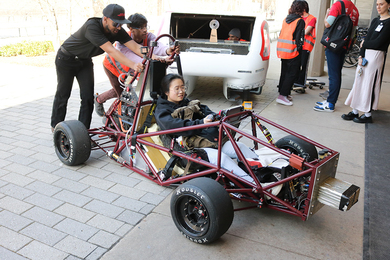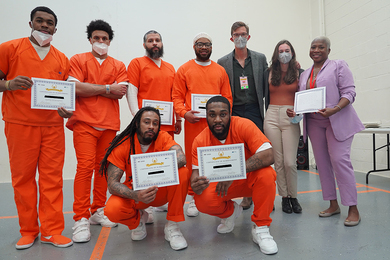Assistant Director David L. Briggs will become director of Lincoln Laboratory on July 1 upon the retirement of Walter E. Morrow Jr., who has been director of the MIT research and development facility since 1977.
In a memo announcing the appointment to Lincoln Laboratory employees, Provost Joel Moses said, "I am fully confident that Dave Briggs will lead the Lincoln Laboratory to a new leadership position in these changing times. He has the vision and administrative skills needed in this era."
"Walter Morrow has so successfully led Lincoln Laboratory that following him as director is both a challenge and a great honor," said Dr. Briggs, who was named an assistant director in 1994. Dr. Briggs will be the Laboratory's 10th director.
He joined Lincoln Laboratory in 1969 after working on the Apollo Project. A native of Washington, PA, and a 1962 graduate of Pennsylvania State University, Dr. Briggs worked at the General Electric Knolls Atomic Power Laboratory in Schenectady, NY, while doing postgraduate work at Renssalaer Polytechnic Institute. He received the MS in 1964 and the PhD in 1967.
Dr. Briggs became a member of the Laboratory Steering Committee in 1987 and the head of the Air Defense Technology Division in 1992. "In all [of his] roles, he has performed outstandingly," said Provost Moses.
As an assistant director, Dr. Briggs has responsibility for programs supported by the Air Force, Army, Navy and Defense Advanced Research Projects Agency (DARPA), as well as several joint military service activities. He has been involved in major projects for air defense and ballistic missile defense.He also has headed several ad hoc committees devoted to adapting the laboratory's strategic planning in the new defense environment. Lincoln Laboratory, founded in 1951, received $387 million in federal research funds in fiscal 1997.
FUTURE CONCERNS
"There is a nearly unanimous view that Lincoln Laboratory is doing extremely well," said Provost Moses. "Clearly, much credit for this must be given to Walter Morrow. There are concerns about the future that the new Laboratory administration will have to continue to address. The directions of the DOD may and likely will continue to change, and the Laboratory must both lead and react to such changes."
"Continuing the Laboratory's tradition of innovation and excellence in a time of changing defense requirements and tight fiscal constraints is of critical importance," said Dr. Briggs, who also sees increasing opportunities to combine the creative technical talents on campus and in the Laboratory.
"With the support of President Vest, Provost Moses and the Lincoln Laboratory staff, I look forward to continuing the Laboratory's commitment to research and development to meet national needs," he said.
A version of this article appeared in MIT Tech Talk on January 28, 1998.





